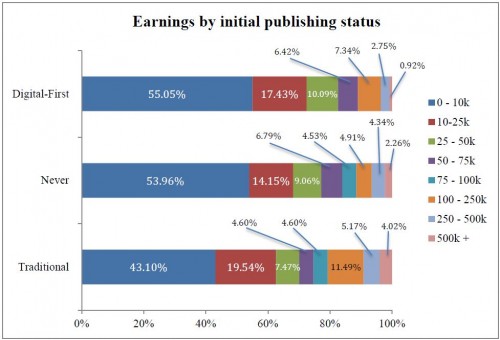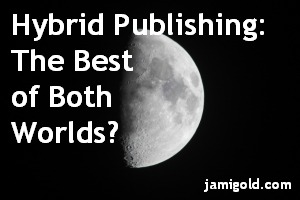I’m going to admit right from the start that this might be a controversial post. My goal is to explore issues while not “bashing” specific groups, but we’ll have to wait and see if I succeed.
We’ve often heard that having the cachet of a publisher name behind us will help no matter how we decide to publish further down the line. I know many authors who want to traditionally publish their first couple of books to build up a name for themselves and then transition to self-publishing for at least some of their later work.
The Hybrid Publishing Path
Bob Mayer coined the term “hybrid” for authors who publish both traditionally and on their own. This has often been described as the best of both worlds.
Hybrid authors get the benefit of a publisher brand, which might come with higher respect, more review opportunities, and wider distribution in print or tricky markets like libraries, etc. They also get the benefit of being able to control the release schedule, pricing, covers, etc. of their self-published works to maximize their income.
Several surveys have shown that hybrid authors have the highest earnings, compared to traditional-only and self-published-only authors. This isn’t surprising if the traditional releases are connecting with a broader spectrum of readers and the self-published releases are bringing in higher royalty percentages.
This best-of-both-worlds idea has inspired many authors to pursue the traditional publishing path even though they plan on self-publishing in the long term. So I’m always interested in more data about how this approach works for authors.
Does Having a Publisher Behind Us Always Help?
One of the observations Beverley Kendall made in her fantastic self-published authors survey struck me in regards to this issue. On page 4 of her report, she compared the earnings of hybrid authors coming from a traditional publisher, the earnings of hybrid authors coming from a digital-first publisher, and the earnings of self-published-only authors.
She found that being published with a digital-first publisher—on average—actually hurts hybrid authors’ income. While hybrid authors coming from New York-style traditional publishers did have the highest income, the self-published-only authors—with no publisher name to back them up—beat the digital-first hybrid authors income-wise.

- For traditionally published hybrid authors, 29.69% earned more than $50K.
- For self-published-only authors, 22.83% earned more than $50K.
- For digital-first hybrid authors, 17.43% earned more than $50K.
The only range that digital-first hybrid authors out-performed self-published-only authors was at $100-250K. Most of us would be thrilled with $100K, so some authors are definitely succeeding in their digital-first hybrid path, and this shouldn’t be taken as a slam on epublishing in total.
That said, Brenda Hiatt’s “Show Me the Money” page reveals low earnings on average for virtually all small publishers—digital-first/epublishers and traditional independent presses alike. Some of us have a goal of income and want to take this history into consideration, and some of us would rather have a partner helping us through the process and thus might discount these reports.
There’s no wrong answer. Only what’s right for us.
Why Doesn’t Digital-First Always Help?
Understanding the income situation might help us decide the best path for us, but I also wanted to explore the other variables affecting Beverley’s results. After all some of the other variables might affect whether a certain path will work for us despite the initial evidence.
Low Sales: Brenda’s “Show Me the Money” page implies that most small publishers can’t push big sales. Especially not enough sales to make up the difference to the cut in royalty compared to self-published-only authors.
If our royalty would be 20-35% less with a digital-first publisher than it would be by self-publishing, the publisher would need to generate that many more sales than we could get on our own to make up the difference. Some digital-first publishers could manage this and some couldn’t. Some of us might have a strong platform on our own and some might not. So there’s no set answer for every author and every situation.
Resistance to Free: Beverley also saw in her survey results that fewer digital-first hybrid authors offer a free series-related book. As we discussed in my initial posts about Beverley’s survey (here and here, and consolidated into my guest post at Kristen Lamb’s blog yesterday), offering a free story to attract readers is part of a successful strategy.
We find this as a differentiating factor between digital-first hybrid authors and self-published-only authors, but traditionally published hybrid authors are even more reluctant to make a story free (page 24 of Beverley’s report). So while this resistance might be a contributing factor to digital-first’s poor showing for hybrid authors, it’s not the driving issue.
Quality: And here’s where this post might get really controversial. Many non-New York traditional publishers suffer from a bad reputation for quality. I’ll share more about this issue and the repercussions in Thursday’s post, but suffice it to say that “small press bad reputation” goes double (at least) for digital-first publishers.
So, many of the benefits for a hybrid author starting off with a publisher—the “higher respect, more review opportunities, and wider distribution in print or tricky markets” I mentioned—might not exist if said publisher is a digital-first publisher. Hmm…
Does This Mean We Should Avoid Digital-First Publishers?
As I stated above, none of this is meant to say that we should always avoid digital-first publishers. We all have different goals, and we might prioritize having a team at our back over some of these potential issues. Maybe our digital-first publisher offers a great contract (which is more unusual than it should be, unfortunately). Maybe our platform is next-to-nothing and any help would be better than none. Or maybe we’ve found a digital-first publisher who does have a good reputation.
We just need to be aware that all publishers are not created equal, especially so when it comes to the benefits for hybrid authors. As always, we need to find the path that works for us and not just imitate what we’ve seen others do. Our circumstances will be different from their circumstances and our goals will be different from their goals, so the only path we should take is the one that’s right for us. *smile*
P.S. Kristen Lamb announced a new WANACon giveaway on her blog yesterday. If you’re signed up for WANACon and you refer someone else to sign up, you’ll get 25 entries in a drawing for three branding and/or plotting consultations. These are incredible prizes and I hope some of my readers are among the winners. *grin* Just make sure your friend references your name when they register for WANACon.
P.P.S. I’m not eligible for this contest, so feel free to mention that you heard about WANACon and the giveaway from my blog, but give credit to another attendee. New signups who give credit to another attendee get 15 entries too. Yay!
Had you heard the advice to start with a publisher before branching into self-publishing? Are you surprised by the big difference the type of publisher can make for hybrid authors? Do you have other thoughts or insights into what might cause that difference? What’s your impression of the quality for digital-first publishers? Are you going to WANACon and want people to reference your name when they sign up? (If so, leave your name in the comments—and yes, moderators are eligible!)

